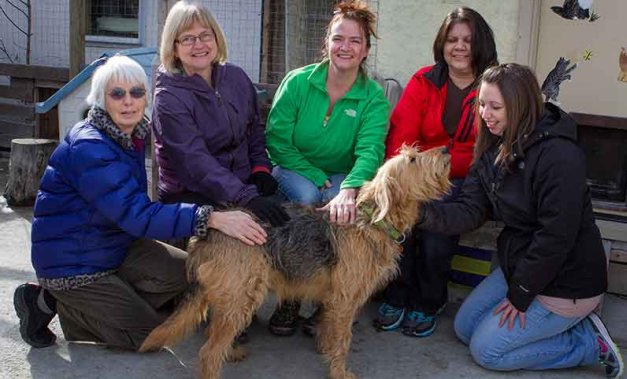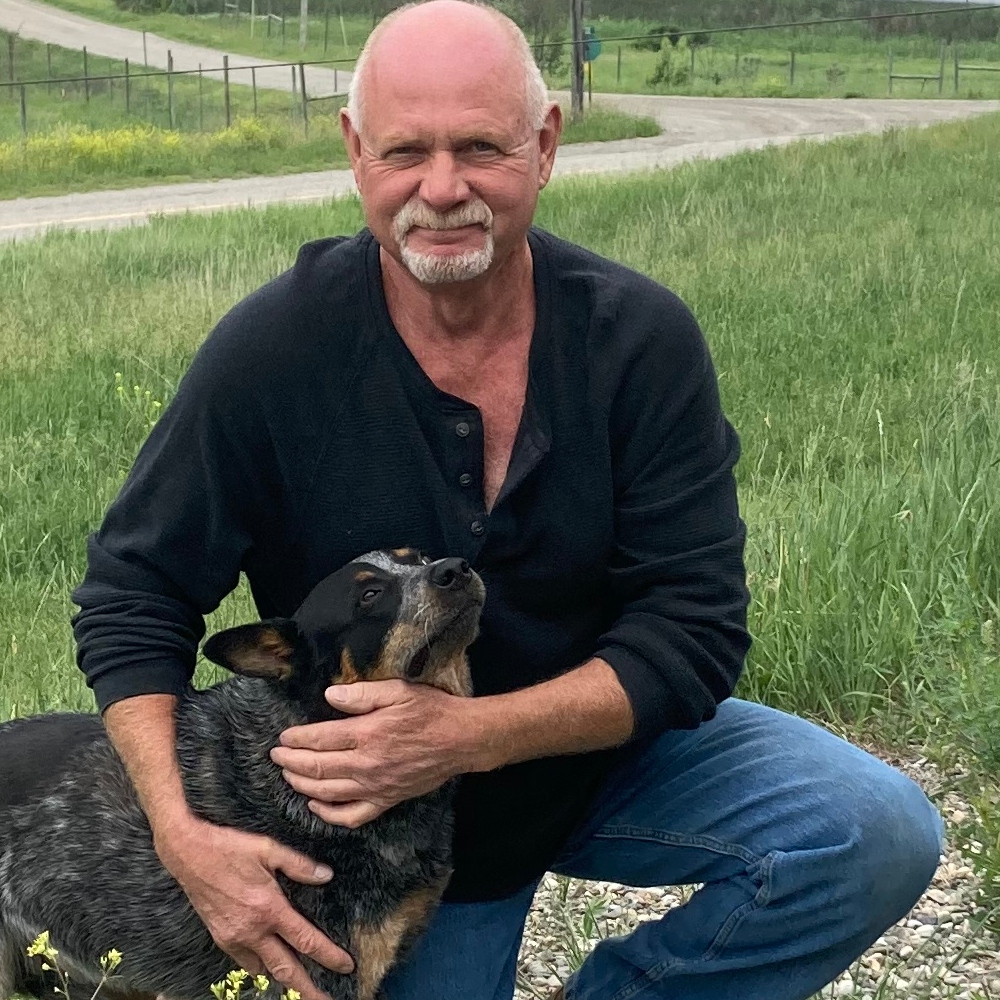Caring for companion animals
The staff at ICAN in Invermere are devoted to public education and animal welfare

The ICAN volunteers work all year round to help animals. — Photo courtesy ICAN
The Invermere Companion Animal Network (ICAN) is changing the lives of pets in the Columbia Valley. ICAN is a non-profit animal rescue and adoption centre staffed by a crew of devoted volunteers; in fact, it is the first facility of its kind in Invermere. The shelter is cage-free and the staff works around the clock 365 days a year to ensure that the animals in their care are healthy and happy. An expansion to the centre is in the initial stages, and there have been numerous events and projects to spread the word about animal welfare in Invermere and beyond. Lana Banham and Anne Futa are two of the caring souls who work at ICAN, and they took the time to answer our questions and share some of the tips that they and the other volunteers have learned along the way.
What should you do if you witness animal abuse or neglect?
One should first understand the difference between casual and neglect. Obviously, a vicious beating or a constantly filthy cage or kennel is grounds for action, but a “shaggy dog” may be perfectly fine, just not groomed to a standard we would prefer. Look for other signs of abuse or neglect as well—low body weight, poor or damaged condition of legs or paws, eyes, skin, fearful or aggressive behaviour or unacceptable living conditions. Document what information you have—names, locations and times. If possible take pictures, and report the abuse to the BCSPCA or the police.
If unsure of what information to look for, find a copy of Animal Protection Law in B.C. (the 2008 version is available on line for free), and refer to page four.
Why should you groom your pet and what should you look for in a good pet groomer?
The benefits of grooming are not just to make your animal look prettier. Grooming enhances the bond between guardian and companion animal. Regular grooming of your pet will allow you to notice any abnormalities in skin and coat, make you aware of skin lesions, injuries, matted fur or parasites. Tell your groomer if your dog has a problem with fleas or ticks so they will know to use a medicated shampoo.
Nail trims are a necessity with most pets. Not trimming the nail will cause them to grow to very uncomfortable lengths, and they can actually grow in a circle and start growing through the pad of the paw. If you prefer to cut your own pet’s nails, be aware of the quick, which is a vein that feeds the nail. It is very painful for your pet if you accidentally cut it, and it also bleeds profusely. If you are unsure of how to cut your animal’s nails, consult a pet groomer.
Many people don’t take matted hair in an animal as a major concern. It is. When matting becomes extreme, it causes the skin to become red, swollen, inflamed and painful. A good groomer should ask you questions about your companion and should genuinely care about him or her. They should also let you know about any problems they had with your pet, or any possible health issues that they may find. A good groomer should put the needs of the animal first.
What factors do you need to consider in choosing a pet food?
Learn what a good weight for your companion animal is, and feed with maintaining that weight in mind. Be aware of how active and mentally stimulated your companion animal is. Inactivity and boredom can lead to weight gain, as can inappropriate foods. Both cats and dogs can get diabetes and, just like in humans, excessive weight is a strong factor.
There is a lot of information available about foods and diets for just about every type companion animal. Take the time to do some research on proper nutrition for yours. Read the ingredients and nutritional values on your pet food. Generally, liver and fish are rich sources of protein and should be used in moderation.
Check out your local pet supply stores. They will know the most popular brands locally, and they will also know about sourcing less commercial foods or specialty blends.
Can you tell us a bit about the importance of vet visits, spaying or neutering and vaccinations and why they are so important?
It is very important to have a good vet for companion animals, at least to ensure their safe spaying or neutering if they aren’t already. Many of the shelter animals are there due to unplanned pregnancies, straying or other disliked behaviours due to mating instincts. If the companion animal is not part of a breeding program (purebred), there is no need to keep them intact. There is little to no benefit in letting a female experience being a mom, just for that sake.
A regular vaccination program for the most fatal and debilitating diseases should be planned by every guardian. Although seeming to be initially expensive in the first year, healthy cats can fall back to a three-year booster program. Prevention is much less costly than dealing with disease issues later, both financially and emotionally. Failure to take basic medical care of pets can be cited as neglect. Even if only an inside pet, some of the diseases are best not given any opportunity.
What are the benefits of adopting versus buying a pet?
The benefits of adopting a companion animal are that the animals being adopted are usually already vaccinated, spayed or neutered and their level of socialization is a known factor. If mature, they are usually already house trained.
The adoption fees at shelters are usually less expensive than purchase fees and combined necessary medical fees for purchased pets.
There is almost always an adoptable companion available at a shelter, even if you are looking for a very specific breed. All it takes is some research. In this day and age, buying a pet at a store can often lead to unintentional support of backyard breeders—people who breed animals for profit. There are thousands of unethical breeders in Canada who keep animals in horrific conditions and do not provide the basic essentials to their animals. These animals are then disposed of, often inhumanely, when they are no longer able to reproduce.
Adopting a shelter animal actually saves two animals: the one you take home and the other who takes their place at the shelter.
What are some of the procedures your shelter undertakes to ensure the welfare of animals that come to you?
- ICAN volunteers work as quickly and gently as they can (to minimize stress) to assess the condition of animals brought in as soon as possible. They take note of any history that comes with the animal, general health and temperament; arrange for immediate clean shelter, food and water. If deemed necessary, isolation for 24 hours to 10 days and/or medical attention is arranged as soon as possible (vaccinations and worming are standard).
- Unless it is confirmed that the animal is surrendered or feral, efforts are made to locate the guardian/home of the animal. ICAN will post the pet’s picture and description on our website and Facebook page. After five days, the animal is legally our property and it is then that we begin the process of adopting out this animal and having them altered and vaccinated. None of ICAN’s charges are adopted out until they are spayed or neutered.
- ICAN requests all potential adopters to complete an application form, which is then reviewed by an ICAN representative. We check with all references, landlords and vet information to ensure that the information given by the adopters is valid. We provide information on the general needs and care of adopted companions. This discourages whimsical behaviours and unsuitable adoptions.
- ICAN operates as a no-kill shelter, taking care of all animals in their charge without a designated time limit. Medical attention is always provided to an animal when needed and fostering for special needs animals is arranged. Euthanasia is only used when an animal has an incurable or terminal illness.
- All of the animals in the care of ICAN are seen to daily by volunteers—the cleaning of their shelter spaces, litter, fresh supply of food and water and socialization. Wherever possible, medication schedules are followed—sometimes requiring a volunteer to make evening or early morning stops, or fostering in home care. The socialization (petting, play and human contact beyond basic care) of animals is also seen to by volunteers. ICAN also uses a network of foster homes to better accommodate the animals’ special needs or socialization.
- ICAN volunteers stage annual fund raisers to finance the daily care and medical needs of its charges and raise public awareness. There is also a lot of research and networking to share knowledge to improve our operations and care. ICAN works with the public to advocate for and educate about proper animal care and support the wellbeing of companion animals within its sphere of influence. ICAN tries to work co-operatively with guardians and caregivers to accomplish the wellbeing of animals.
For more information, visit the ICAN website, www.icanbc.com, and Facebook page, www.facebook.com/ICANBC.






Comments